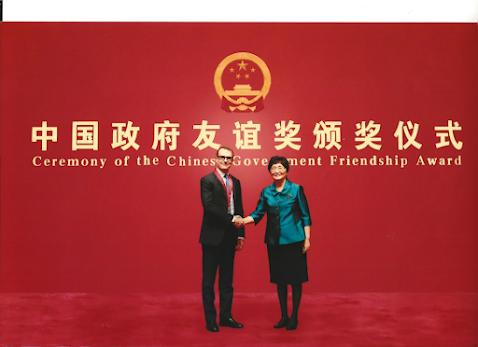CHEN Xuechu: Congratulations on the Successful Convening of CBCGDF Symposium on Promoting the China National Strategic Action Plan for Biodiversity Conservation
On March 29, 2024, the China Biodiversity Conservation and Green Development Foundation (CBCGDF) hosted the first symposium on "Promoting the National Strategic Action Plan for Biodiversity Conservation " in Beijing. A total of 32 speakers, including 92 participants from government departments, enterprises, NGOs, academia, indigenous peoples and local communities, and youth representatives, attended the event, with over a hundred people actively responding and signing the Peoples Participation Movements initiative.
Prof. CHEN Xuechu from East China Normal University participated in the meeting, who in the past 10 years has had the opportunity to lead his students to participate in wetland restoration and related biodiversity conservation in rural areas of Shanghai. He shared some of his thoughts as follows:
Shanghai
is a city built on wetlands. Since ancient times, humans have transformed and
appropriately utilized wetlands in the Yangtze River estuary and Jiangnan water
towns, forming an artificial wetland system full of ecological wisdom, shaping
the landscape and improving ecological functions. According to United Nations
statistics, 1 billion people around the world still rely on wetlands for their
livelihood. The Ramsar Convention on Wetlands advocates "wise use"
and promotes the sustainable use of wetlands without damaging the wetland
ecosystem, based on which we promote the construction of ecological wetlands
with composite functions in Shanghai's suburban areas.
However,
in practice we have also found that wetland-based biodiversity conservation
faces many challenges. If the primary purpose of wetlands is "biodiversity
conservation", then surrounding human activities are often subject to
strict restrictions, which is quite difficult for metropolitan areas with
relatively tight production and living space. Therefore, I suggest that in the
core areas of metropolitan areas and rural areas, we should learn from the
ecological wisdom of the ancient Chinese and find ways to take into account
both human use and biodiversity protection.
I
noticed that the "National Biodiversity Conservation Strategy and Action Plan (2023-2030) "
issued recently strongly advocates the practice of OECMs, which is very
important for a metropolis like Shanghai with limited space resources but high
ambitions for biodiversity conservation. It is undoubtedly a promising
solution. But I also appeal that to promote the implementation of OECMs and
achieve the benefit of wetlands, supporting policies need to be followed up. In
terms of specific operations, an urban biodiversity conservation fund can be
established to support communities and enterprises in jointly protecting and
utilizing OECMs areas and wetlands, and on this basis, a biodiversity
experience center can be built.
Original Chinese Article: https://mp.weixin.qq.com/s/kGOQ2H6H0eaKun-LlAlsww
Translator: Sara
Checked
by: Daisy
Editor:
Sara
Contact:
v10@cbcgdf.org; +8617319454776
Contribution
Do you know? We
rely on crowd-funding and donations. You have the opportunity to help an
international movement to advance biodiversity conservation. Donate TODAY to
power up the movement to make it a better world for all life.
Donation(501C3)Paypal:
intl@wbag.org
https://www.paypal.com/donate/?hosted_button_id=2EYYJJZ8CGPL






Comments
Post a Comment